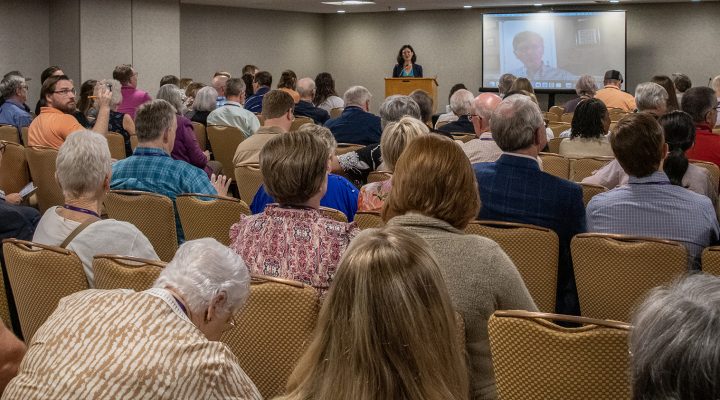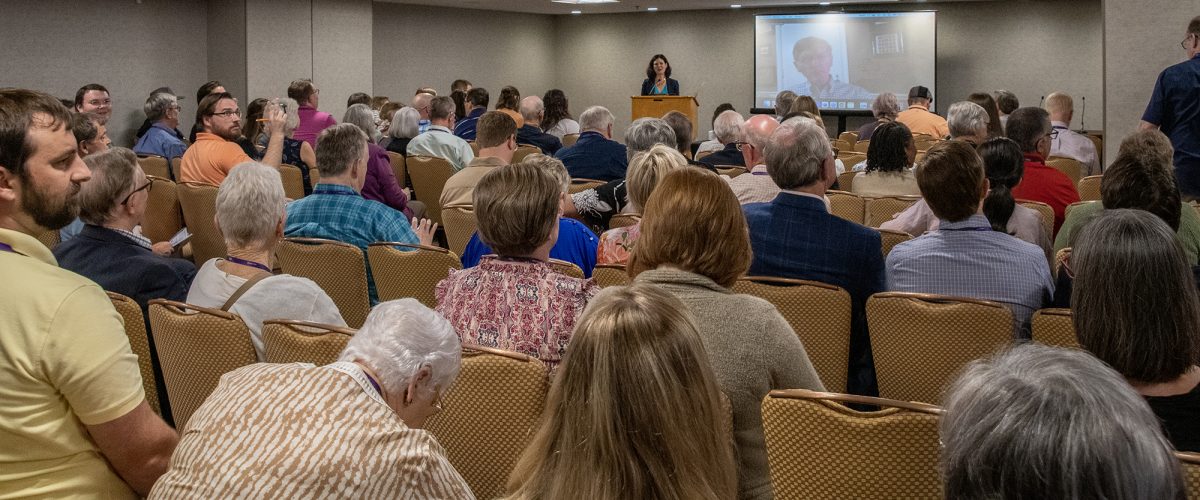Baptists must tap into their radical Christians roots to help counter the white Christian nationalism that threatens American democracy and social justice, warned Amanda Tyler and Bill Leonard.
The duo spoke during a June 29 breakout session at the Cooperative Baptist Fellowship’s General Assembly in Atlanta.
In pioneering the ideals of soul freedom and religious freedom, early Baptists gained a reputation as radical visionaries who championed the separation of church and state, said Tyler, executive director of Baptist Joint Committee for Religious Liberty.
And that 17th-century perspective put the movement at odds with the Christian nationalists of their day just as it does for many contemporary Baptists, she added. “It’s in our Baptist DNA.”
Tyler co-led the Learning Labs session focused on Baptist identity with Leonard, founding dean and professor of Baptist studies and church history emeritus at Wake Forest University School of Divinity, who joined via video link.
The earliest Baptist leaders and teachings espoused an understanding of faith and religious pluralism that stood in direct opposition to the church-state Christian nationalism of their day, Tyler said.
She referenced a 1611 writing by English Baptist Thomas Helwys she said should be embraced by 21st-century Baptists struggling against those who seek to conflate American government and faith: “For we do freely profess that our lord the king has no more power over their consciences than over ours, and that is none at all. For our lord the king is but an earthly king, and he has no authority as a king but in earthly causes. … For men’s religion to God is between God and themselves. The king shall not answer for it. Neither may the king be judge between God and man. Let them be heretics, Turks (Muslims), Jews, or whatsoever, it appertains not to the earthly power to punish them in the least measure. This is made evident to our lord the king by the scriptures.”
Preaching in the 20th century, Martin Luther King Jr. warned just as prophetically against the ideology that seeks to merge Christian and American identities, Tyler said.
“As long as the church is a tool of the state it will be unable to provide even a modicum of bread for men at midnight.”
“The church must be reminded once again that (it) is not to be the master or the servant of the state, but the conscience of the state,” King preached. “It must be the guide and the critic of the state — never its tool. As long as the church is a tool of the state it will be unable to provide even a modicum of bread for men at midnight. If the church does not recapture its prophetic zeal and cease to be an echo of the status-quo, it will be relegated to an irrelevant social club with no moral or spiritual authority.”
Tyler said Baptists and others can participate in recapturing the spirit of these and other teachings by connecting with the resources provided by BJC’s Center for Faith, Justice and Reconciliation and through Christians Against Christian Nationalism.
Leonard said congregations bear some of the responsibility for resurrecting the spirit of courage and religious pluralism advocated by the early Baptists. “Baptist churches must find ways to teach Baptist history. These days they either don’t know it, or they know the wrong kind.”
A deep dive into the subject reveals the first Baptists understood themselves as “a company of faithful people” bound together by the belief that all are called to Christ and that “Christianity begins not with doctrine but with a change of heart.”
Those founders also deeply valued the reliance on individual conscience for the interpretation of Scripture, which shaped their concept of the priesthood of all believers, Leonard said. “The genius of the early Baptists was their understanding that people can be trusted both by growing up in church and through dramatic conversion.”
The early Baptists courageously followed their conscience in matters of faith and pluralism even though it placed their movement in crosshairs of European governments which, like England, required infant baptism as a condition of citizenship. Subsequent persecution sent many abroad because “for Baptists, God alone is judge of conscience, not the state or anyone else. Faith must be uncoerced, except by the Holy Spirit,” Leonard said.
Reviving those teachings and values is crucial at a time when “something in the religion of the heart has been lost,” he added. The Jesus story must be retold in a way relevant to current generations or “people will bail” on the church and Christianity.


